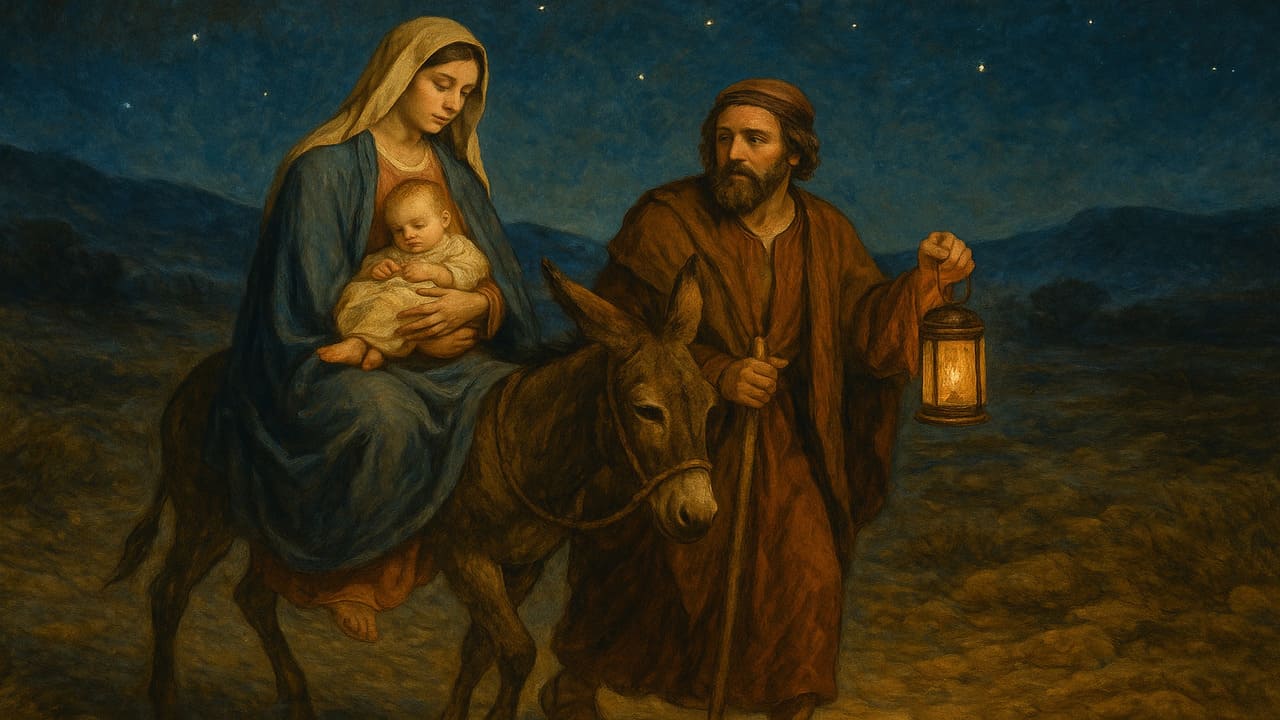
Thorn Ville Church – The Flight to Egypt is a pivotal moment in the early life of Jesus, recorded in the Gospel of Matthew (Matthew 2:13–15). It takes place shortly after the visit of the Magi, who had followed a star to find the newborn “King of the Jews.” Warned in a dream not to return to King Herod, the Magi departed by another route. That same night, Joseph received a divine message through an angel: “Arise, take the child and his mother, and flee to Egypt, and remain there until I tell you; for Herod is about to search for the child, to destroy him.”
This urgent command set the Holy Family Joseph, Mary, and the infant Jesus on a dangerous journey. The Gospel narrative offers few details about the route or length of the trip, but the urgency is clear: it was a matter of life and death. Herod, threatened by the prophecy of a new king, would soon order the massacre of all boys under two years old in Bethlehem and its surrounding area, an event known as the Massacre of the Innocents.
Egypt was a logical refuge for several reasons. At the time, it was part of the Roman Empire but outside Herod’s jurisdiction, providing safety beyond his reach. Egypt was also home to a large Jewish diaspora community, particularly in Alexandria, which could have offered familiarity and support to the traveling family.
Traveling from Bethlehem to Egypt was no small undertaking. The distance likely over 100 miles depending on the route would have been challenging for a family with a newborn, especially in an era without modern transportation. Harsh desert terrain, the need for food and water, and the constant risk of bandits made the journey perilous. Yet the choice of Egypt also carries deep symbolic weight in Scripture, as it had long been a place of both refuge and exile for the people of Israel.
The Flight to Egypt is more than a dramatic escape; it is deeply rooted in biblical prophecy. Matthew’s Gospel notes that this event fulfills the words of the prophet Hosea: “Out of Egypt I called my son” (Hosea 11:1). While Hosea originally referred to the nation of Israel’s deliverance from Egypt during the Exodus, Matthew applies it typologically to Jesus, portraying Him as the new Israel God’s chosen one who will bring ultimate deliverance.
This prophetic link reinforces a pattern found throughout the Bible: God’s redemptive plan often echoes earlier events in new and greater ways. Just as God protected Israel in Egypt before bringing them into the Promised Land, so too He protected Jesus in Egypt before the beginning of His public ministry.
The Flight to Egypt holds multiple layers of meaning. On one level, it illustrates God’s providence and care for those He has chosen for a special purpose. The angel’s warning and Joseph’s immediate obedience show a divine plan in motion, one that safeguards the Savior in His vulnerable infancy.
On another level, Egypt symbolizes both safety and exile. In Israel’s history, it was the land where Joseph, son of Jacob, rose to power and saved his family during famine. It was also the place of bondage from which Moses led the people to freedom. For Jesus to enter Egypt is to retrace Israel’s story in miniature facing displacement, yet destined for deliverance.
The story of the Flight to Egypt has inspired centuries of Christian art, literature, and devotion. Painters from Giotto to Rembrandt have depicted the Holy Family traveling under night skies or resting under the shade of palm trees. In Coptic Christian tradition, the journey is celebrated with specific sites in Egypt believed to have sheltered the family, such as churches in Cairo and along the Nile. Pilgrims visit these places to this day, honoring the sacredness of the journey.
The narrative also resonates with modern experiences of displacement. For many believers, it offers comfort in the assurance that God is present in times of exile and uncertainty. The Holy Family’s time as refugees reminds Christians that Jesus Himself knew what it meant to be vulnerable and to depend on the hospitality of strangers.
Rather than ending with a conclusion, it is worth reflecting on the enduring lessons the Flight to Egypt offers for contemporary faith. First, it teaches the importance of obedience to divine guidance. Joseph acted without hesitation, trusting God’s instructions even when they disrupted his life. Second, it underscores God’s protective care, reassuring believers that He is able to preserve them through dangers they may not even fully perceive.
Finally, the story calls the faithful to empathy toward those forced to flee their homes today. In remembering that the Savior began His life as a refugee, Christians are invited to see Christ in the faces of those seeking safety, and to respond with compassion and tangible support. The Flight to Egypt, then, is not only a historical episode but a living call to trust, protect, and show mercy in a world still in need of refuge.
Thornville Church - Your Source for Biblical Inspiration - The story of Daniel in the Lion’s Den remains a powerful…
Thornville Church - Your Source for Biblical Inspiration - Early christian sacred spaces have left a lasting cultural impact that…
Thornville Church - Your Source for Biblical Inspiration - haunted locations featured horror games have become central to the spine-chilling…
Thornville Church - Your Source for Biblical Inspiration - church symbols and icons hold profound significance in Christian worship, serving…
Thornville Church - Your Source for Biblical Inspiration - ancient churches spreading gospel were foundational in establishing the early Christian…
Thornville Church - Your Source for Biblical Inspiration - early church ruins significance spiritual remains a profound chapter in the…